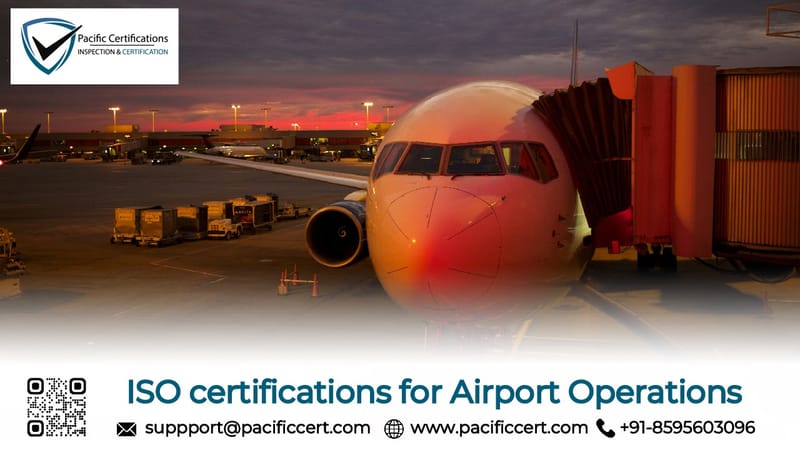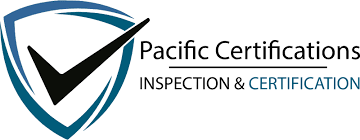ISO Certifications for Airport Operations, Requirements and Benefits

Introduction
Airports connect people, goods, and economies. On an average day, thousands of flights take off and land worldwide, with airports handling millions of passengers, massive cargo volumes, and critical services that keep air transport safe. These facilities must run around the clock, managing everything from flight schedules to baggage handling, security screening, maintenance, ground transport, catering, and emergency response.
With global passenger traffic expected to reach 10 billion annually by 2050(ICAO), airports are under pressure to operate reliably, sustainably, and securely. Any lapse, whether a safety incident, cyberattack, or baggage failure can disrupt operations at scale. ISO certifications give airport operators a way to set consistent standards and build passenger trust.
In airport operations, every safe landing and smooth departure is supported by systems that quietly manage risk, reliability, and responsibility.
Quick Summary
ISO certifications help airport operators improve service quality, protect workers, reduce environmental impact, and secure digital systems. The most relevant standards include ISO 9001, ISO 14001, ISO 45001, ISO 22301, and ISO/IEC 27001. Certification reassures regulators, airlines, and passengers that airports are safe, reliable, and future-ready.
For more information on how we can assist your airport operations with ISO certifications, please contact us at [email protected].
Applicable ISO Standards for Airport Operations
Several ISO standards are particularly relevant to airport operations, covering a wide range of aspects including quality management, environmental stewardship, energy efficiency, occupational health and safety, and information security. Below are some of the key ISO standards applicable to airport operations:
ISO 9001:2015 - Quality Management Systems (QMS)
ISO 9001 is the global standard for quality management systems. It helps airport operators implement a systematic approach to managing processes and ensuring consistent service delivery.
ISO 14001:2015 - Environmental Management Systems (EMS)
ISO 14001 sets the criteria for an effective environmental management system. Airports adopting this standard can better manage their environmental responsibilities, including reducing carbon footprints, managing waste, and minimizing noise pollution.
ISO 45001:2018 - Occupational Health and Safety Management Systems (OHSMS)
Safety is a critical concern in airport operations. ISO 45001 provides a framework for managing occupational health and safety risks, helping to prevent workplace accidents and injuries.
ISO 55001:2014 - Asset Management
Effective asset management is crucial for airports, which manage extensive infrastructure and equipment. ISO 55001 helps airport operators manage the lifecycle of assets, ensuring their reliability, availability, and performance.
ISO 50001:2018 - Energy Management Systems (EnMS)
Energy efficiency is a major concern for airports due to their high energy consumption. ISO 50001 provides a framework for managing energy use, improving energy efficiency, and reducing greenhouse gas emissions.
ISO 27001:2022 - Information Security Management Systems (ISMS)
ISO 27001 helps airports protect their information assets, including passenger data, operational information, and communication systems. This standard ensures that airports have robust measures in place to prevent cyber threats and data breaches.
ISO 20121:2012 - Event Sustainability Management Systems
Airports often host events, such as conferences and exhibitions. ISO 20121 helps airports manage these events sustainably, minimizing their environmental impact and ensuring social responsibility.
ISO 22301:2019 - Business Continuity Management Systems (BCMS)
ISO 22301 provides a framework for managing business continuity, ensuring that airports can quickly recover from incidents such as natural disasters, security threats, or system failures.
Click here to find out more applicable standards to your industry
What are the requirements of ISO Certifications for Airport Operations?
Understanding the specific requirements of each ISO standard is crucial for implementing effective management systems in airport operations. Below is an overview of the key requirements for each ISO standard listed:
General requirements:
Certification requires airports to establish formal management systems that cover all aspects of their services. Common requirements include:
Covering passenger services, cargo, ground handling, security, and other airport functions.
Written commitments on safety, service quality, sustainability, and data protection.
Identifying risks such as accidents, cyberattacks, equipment failures, and emergency scenarios.
Standardizing processes for check-in, baggage handling, fueling, runway operations, and security checks.
Ensuring staff are equipped for customer service, safety drills, IT systems, and emergency response.
Tracking KPIs such as flight turnaround times, baggage mishandling rates, emissions, and passenger feedback.
Maintaining logs of operations, incidents, inspections, and audits.
Periodic checks to ensure systems remain effective and compliant.
Specific requirements:
ISO 9001:2015 - Quality Management Systems (QMS) Requirements
Context of the Organization: Identify internal and external issues, understand the needs and expectations of interested parties, and determine the scope of the QMS.
Leadership: Establish quality objectives and policies that align with the organization’s strategic direction, ensuring top management's involvement and accountability.
Planning: Address risks and opportunities, establish quality objectives, and plan changes within the QMS.
Support: Provide necessary resources, ensure staff competence, awareness, and communication, and maintain appropriate documentation.
Operation: Plan, implement, and control processes to meet quality requirements, including product and service design, production, and delivery.
Performance Evaluation: Monitor, measure, analyze, and evaluate the QMS, including conducting internal audits and management reviews.
Improvement: Continuously improve the QMS by addressing nonconformities and implementing corrective actions.
ISO 14001:2015 - Environmental Management Systems (EMS) Requirements
Context of the Organization: Understand environmental aspects and their impacts, considering both external and internal issues.
Leadership: Demonstrate commitment to environmental management by integrating environmental policies with the organization’s strategy.
Planning: Identify environmental risks and opportunities, set environmental objectives, and plan actions to achieve them.
Support: Ensure availability of resources, raise awareness, and maintain competence in environmental management, along with proper communication and documentation.
Operation: Implement controls to manage environmental aspects, including life cycle perspective, emergency preparedness, and response.
Performance Evaluation: Monitor and measure environmental performance, conduct internal audits, and review the environmental management system.
Improvement: Take actions to continually improve the environmental management system, focusing on enhanced environmental performance.
ISO 45001:2018 - Occupational Health and Safety Management Systems (OHSMS) Requirements
Context of the Organization: Identify and understand the internal and external factors affecting occupational health and safety.
Leadership and Worker Participation: Ensure leadership commitment and active worker participation in health and safety matters.
Planning: Identify hazards, assess risks, and determine opportunities for improving occupational health and safety. Establish OH&S objectives and plans to achieve them.
Support: Provide the necessary resources, ensure competence, awareness, communication, and proper documentation related to OH&S.
Operation: Plan and control processes, implement hazard controls, manage changes, and prepare for emergency situations.
Performance Evaluation: Monitor, measure, analyze, and evaluate OH&S performance through audits and reviews.
Improvement: Identify opportunities for improvement and take actions to enhance OH&S performance, including addressing nonconformities.
ISO 55001:2014 - Asset Management Requirements
Context of the Organization: Understand the internal and external factors that influence asset management, including stakeholder needs and expectations.
Leadership: Define the asset management policy, assign responsibilities, and ensure alignment with organizational objectives.
Planning: Develop asset management plans, considering risks and opportunities, and set clear objectives for asset management.
Support: Provide the necessary resources for asset management, ensuring competent staff, effective communication, and proper documentation.
Operation: Implement and control asset management activities, including life cycle management, performance monitoring, and maintenance planning.
Performance Evaluation: Monitor, measure, and analyze asset management performance, conduct internal audits, and review the asset management system.
Improvement: Continuously improve asset management practices, focusing on enhanced asset performance and organizational objectives.
ISO 50001:2018 - Energy Management Systems (EnMS) Requirements
Context of the Organization: Understand energy-related issues, including external and internal factors affecting energy performance.
Leadership: Establish an energy policy that aligns with the organization’s strategic objectives, and ensure leadership commitment to energy management.
Planning: Identify energy opportunities, set energy objectives, and develop action plans to achieve improved energy performance.
Support: Ensure resources, competence, and awareness in energy management, along with effective communication and documentation.
Operation: Implement controls to improve energy performance, manage significant energy uses, and plan for energy-efficient processes and systems.
Performance Evaluation: Monitor, measure, and analyze energy performance, conduct internal audits, and review the energy management system.
Improvement: Continuously improve energy performance by addressing nonconformities and implementing corrective actions to achieve energy objectives.
Tip: Airports should begin with ISO 9001 to ensure consistent service quality, then add ISO 14001 and ISO 45001 to meet environmental and safety obligations. With digital systems now central to operations, ISO/IEC 27001 is becoming an essential next step.
Looking for ISO certification for your airport operations? We’re here to help. Email us at [email protected] or give us a call at +91-8595603096.
What are the benefits of ISO Certifications for Airport Operations?
Below are the key benefits of implementing ISO standards into Airport operations:
Improved passenger experience: Structured processes reduce delays, baggage errors, and complaints.
Safer workplaces: ISO 45001 reduces risks for ground crews, security staff, and maintenance teams.
Environmental compliance: ISO 14001 helps airports manage emissions, noise, and waste, improving community relations.
Operational resilience: ISO 22301 ensures services continue during crises such as strikes, cyberattacks, or natural disasters.
Energy and cost savings: ISO 50001 supports efficient use of electricity, heating, and cooling in terminals.
Regulatory confidence: Certification reassures authorities of compliance with international aviation standards.
Market advantage: Certified airports gain stronger reputation with airlines, passengers, and investors.
Airports are undergoing rapid change. Passenger traffic is recovering to pre-pandemic levels, and forecasts suggest steady growth over the next two decades. This has put pressure on facilities to expand capacity while keeping costs under control.
Sustainability is a major driver. Many airports are committing to net-zero carbon goals by 2050, requiring structured systems for energy efficiency, renewable adoption, and waste management areas supported by ISO 14001 and ISO 50001.
Digitalization is reshaping operations. From biometric boarding and AI-driven scheduling to cybersecurity defenses, technology is central to the airport of the future, making ISO/IEC 27001 highly relevant. At the same time, airports are facing stricter scrutiny from regulators and communities over safety, passenger rights, and environmental impact.
Airports that adopt ISO certifications not only meet these challenges but also strengthen their position as trusted global transport hubs.
How Pacific Certifications Can Help?
Pacific Certifications is accredited by ABIS, acts as an independent certification body for airport operators by conducting impartial audits against applicable ISO standards. Our role is to objectively assess whether documented management systems and airport operations conform to international ISO requirements, based strictly on verifiable evidence.
We support airport organizations through:
Independent certification audits conducted in accordance with ISO/IEC 17021
Objective assessment of airport operations, safety systems, and asset controls
Clear audit reporting reflecting conformity status and certification decisions
Issuance of internationally recognized ISO certificates upon successful compliance
Surveillance and recertification audits to maintain certification validity
If you need support with ISO certification for your airport operations, contact [email protected]or +91-8595603096.
Author: Seema
Read more: Pacific Blogs

